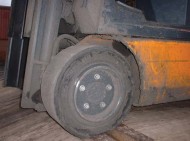 As the only part of a fork lift truck which is always in contact with the ground, a tyre can be especially vulnerable to damage, making them a potentially dangerous and expensive hazard.
As the only part of a fork lift truck which is always in contact with the ground, a tyre can be especially vulnerable to damage, making them a potentially dangerous and expensive hazard.
Selection and fitting
The choice of tyre will depend on the type of truck and the working environment. Your fork lift truck dealer will advise on this and, if needs be, obtain further specialist advice from an industrial tyre manufacturer or supplier.
Maintenance
Tyres for fork lift trucks – like their automotive counterparts – are vulnerable to damage which can lead to serious accidents. When damaged, in poor condition, or (in the case of pneumatic tyres) under or over inflated, tyres may adversely affect a truck’s stability -risking life and load.
Regulation 5 of the Provision and Use of Work Equipment Regulations 1998 (PUWER 98) states: “Every employer shall ensure that work equipment is maintained in an efficient state, in efficient working order and in good repair”. This is primarily to ensure that the equipment is safe, but it also has implications for productivity.
A sound system of daily and pre-shift checks is the cornerstone of good tyre maintenance. This ensures that potential defects are identified before they become a problem. Tyre condition should also be monitored as part of regular, preventative maintenance. Further guidance on this can be provided by the fork lift truck dealer who provided the equipment.
Action should be taken to replace damaged or worn tyres without delay. Importantly, only trained fork lift truck engineers and/or reputable tyre companies may fit or repair tyres.
Assessing wear
Tyre wear can be difficult to assess. Ensuring your tyres are in good condition is vital for safety. If you are in any doubt, seek advice from your fork truck supplier.
Pneumatic tyres must have a minimum of 1mm of tread over the centre and 75% of tread around the complete circumference.
Solid rubber resilient tyres may be used until they are worn to the wear indicator, also known as the 60J line. For an illustration of the 60J line see Fact Sheet 20 (shown).
Press-On Band, Moulded Direct and Conical Base Tyres may be used until two-thirds of the original thickness remains. They should be changed if there is any sign of damage, deformation or the tyre coming away from the wheel.
Not all tyres have a tread. Some tyres that do can be re-grooved, but this should only be done professionally, in accordance with the tyre manufacturer’s instructions and never below the 60J line.
Free fact sheets covering this topic, alongside a host of others answering common fork lift truck queries, are available for immediate viewing from the FLTA website: www.fork-truck.org.uk/fact-sheets.




Comments are closed.